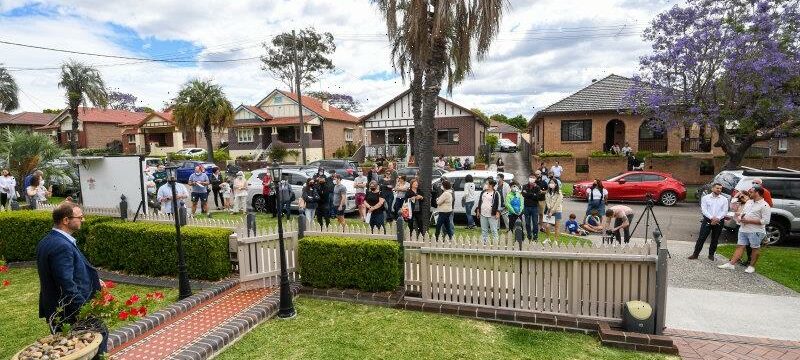For our free coronavirus pandemic coverage, learn more here.
Why did house prices soar while the economy was weak amid multiple lockdowns and a pandemic-induced recession?
Record low interest rates helped homebuyers borrow more money, but with the benefit of hindsight, economists also point to healthy levels of vaccine-induced confidence that may have contributed to a property boom when many expected a bust.
Although low interest rates have been the primary factor driving housing markets, household balance sheets are also in very good shape.Credit:Peter Rae
Sydney property values rose another 0.9 per cent in November, to be 25.8 per cent higher over the past year, CoreLogic figures released on Wednesday show. Melbourne was up another 0.6 per cent in the month and 16.3 per cent annually, while values nationally rose 1.3 per cent in a month and 22.2 per cent in a year.
It’s the slowest pace of growth since January as an increase in homes listed for sale gives buyers more choice and affordability constraints bite, after prices pushed higher during the months of Delta lockdown.
In contrast, the winter outbreak took a toll on the economy, which contracted 1.9 per cent in the September quarter, Australian Bureau of Statistics figures showed on Wednesday.
When the pandemic first hit, no one knew how it would unfold, Westpac senior economist Matthew Hassan said, and property prices fell modestly while it took some time for the Reserve Bank’s interest rate cuts to work through and push both demand and prices higher.
“What was completely different about the experience [of Delta] was the availability of vaccines,” Mr Hassan said.
“There was a much greater confidence we would be able to deal with the outbreaks over time, and that vaccines would offer a longer-lasting remedy to the COVID problem.”
Mr Hassan cites the Westpac-Melbourne Institute survey that showed consumer confidence was still in positive territory through the Delta outbreak, and particularly strong among respondents who had received vaccines or intended to.
This meant consumers were already optimistic when going into the shock and saw the lockdowns as a temporary disruption, he said.
For those who kept their jobs, many were able to save more and were then willing to spend it on buying a home or renovating.
ANZ senior economist Felicity Emmett said although low interest rates have been the primary factor driving housing markets, household balance sheets are also in very good shape.
“You’ve had this big increase in saving rates and a big increase in deposits,” she said.
“Because of those really limited spending opportunities, households have been casting their eye around, what to do with their money.“
The rise in prices has created an affordability issue, and first-home buyer activity has declined after buyers brought forward purchases last year to take advantage of government incentives, she said, adding the affordability worries show up in the Melbourne Institute survey that shows consumers think now is not a good time to buy a home.
Homebuyers were confident making decisions, supported by vaccine-led optimism, low interest rates and government stimulus.Credit:Peter Rae
AMP Capital chief economist Shane Oliver said prospective homebuyers learned from last year’s experience of lockdowns, when initially nerves prevailed and purchasing decisions were delayed.
This time, the idea of lockdown was not unfamiliar, and positives such as cheap debt and government support prevailed, he said.
“People were confident there would be an endpoint,” he said.
Buyers were also willing to pay over the odds for properties when there were few for sale, as many homeowners waited until the health situation improved before deciding to sell.
As the volume of listings and auctions has increased, buyers have started to enjoy more choice and, in some cases, less competition.
Auction clearance rates have edged lower as a result and prices are still rising, but not as fast.
At the same time, fixed mortgage rates have started to get more expensive as the Reserve Bank winds back its pandemic-era stimulus, while the maximum amount homebuyers can borrow has been cut by about 5 per cent in a move by the bank regulator to ensure buyers can still repay their loans as rates rise.
And at some point, buyers can no longer keep up with sky-high asking prices.
The signs of a housing market slowdown come against a backdrop of an improving economy. Retail sales rose as lockdowns ended, credit card spending is up and mobility is rising, Dr Oliver said.
He expects housing price growth to slow to 5 per cent in 2022, followed by a fall of 5 to 10 per cent in 2023.
Mr Hassan, who forecasts prices to slow before flattening out by the end of next year, pointed out that house prices often do not move in line with the wider economy.
“As we head into next year, the housing market is going to be responding to very different factors to the wider economy, particularly the deteriorating affordability,” he said.
“Next year is when the economy catches up. The housing market has shot ahead because it’s more sensitive to the interest rate move and it’s less impeded by disruptions from COVID.”
The Morning Edition newsletter is our guide to the day’s most important and interesting stories, analysis and insights. Sign up here.
Most Viewed in Property
Source: Read Full Article


